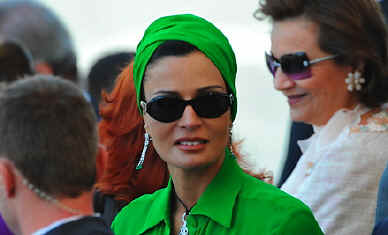Progressive social policies are increasingly under attack in international forums. Muslim countries are in the forefront of this campaign but they are also aided by rightwing elements in the United States and by countries where social conservatism has become part of nationalist discourse.
The United Nations will hold a three-day meeting in New York next month in a move towards ending the worldwide Aids epidemic by 2030. But preparations for the meeting were thrown into disarray last week when Egypt blocked 11 gay and transgender advocacy groups from attending.
In a letter to the UN, Egypt gave no reason for objecting to the groups' participation but said it was acting on behalf of the Organisation of Islamic Cooperation (OIC), which represents 57 predominantly Muslim countries.
The UN responded by emphasising the need for "nongovernmental organisations working on the ground" to contribute to the discussion, and to hear "the voices of people living with HIV and people most affected by the epidemic, including women and girls, sex workers, people who use drugs, gay men and other men who have sex with men and transgender people".
Samantha Power, the American ambassador to the UN, also complained about the blocking action by Egypt and the OIC. "Given that transgender people are 49 times more likely to be living with HIV than the general population, their exclusion from the high-level meeting will only impede global progress in combating the HIV/Aids pandemic," she said.
It is the second time in less than two months that something of this kind has happened at the UN. In March, Saudi Arabia – where the OIC has its headquarters – objected to a report from Juan Méndez, the UN special rapporteur on torture, who had been asked to consider how the prohibition of torture in international law could be applied "to the unique experiences of women, girls, and lesbian, gay, bisexual, transgender and intersex persons".
According to the UN's record of the ensuing discussion, Saudi Arabia complained that the report included 65 references to sexual orientation (there were actually 13) and described it as "an attempt to use the eradication of torture to promote other issues".
The UN's rationale in commissioning the report was that this has been a neglected aspect of attempts to prevent torture, and that women, girls and LGBT people "are at particular risk of torture and ill-treatment when deprived of liberty, both within criminal justice systems and other, non-penal settings".
The sheer size of the OIC – more than a quarter of the UN's total membership – makes it a powerful lobby in international forums, and Muslim countries have long been in the forefront of opposition to LGBT rights and sexual freedoms more generally. But they are not alone: several of these states have a long history of collaborating internationally with conservative religious elements in the west and, more recently, with countries where conservative social policies have become incorporated into nationalist discourse.
One effect of this has been to reinvigorate conservative social forces in the west – notably the most reactionary parts of the Catholic church, the Mormons and some Christian evangelicals. As their influence among the public waned, these elements began to realise that joining forces with authoritarian regimes in other parts of the world could give them some much-needed political muscle.
A 'miracle' in Istanbul
The first indication of what such an alliance might achieve came 20 years ago, with an event sometimes described as "the Istanbul miracle". It happened at a UN conference in Turkey called Habitat Two. Richard Wilkins (who later became head of the Mormons’ World Family Policy Center) was there and, according to his own account, helped to initiate the miracle:
"The Istanbul conference was convened in large measure by a worldwide, well-organised and well-funded coalition of governments, politicians, academicians and non-governmental organisations that were eager to redefine marriage and family life. Natural marriage, based on the union of a man and a woman, was described by professors, politicians and pundits as an institution that oppressed and demeaned women. The constant claim was that 'various forms of the family exist', and all 'various forms' were entitled to 'legal support'. The 'form' most often discussed by those in charge of the conference was a relationship between two individuals of the same gender."
Wilkins challenged all this with a speech on traditional family values which also castigated sex education in schools. He was hissed by some of the delegates as he returned to his seat but afterwards, he recalled, "I was approached by the ambassador from Saudi Arabia who embraced me warmly". Wilkins gave the Saudi ambassador a list of suggested changes to the draft Habitat agenda, and the Istanbul Miracle was born.
"Thirty-six hours later, the heads of the Arab delegations in Istanbul issued a joint statement, announcing ... that its members would not sign the Habitat agenda unless (and until) certain important changes were made," Wilkins wrote. As a result, the draft was altered to define marriage as a relationship between husband and wife, and references to "abortion" were changed to "reproductive health".
Qatar and the Mormons
Fast-forward a few years: in 2004 Qatar hosted a conference to "defend the family" which was organised on Qatar's behalf by the World Family Policy Centre, a front organisation of the Mormon church. Interestingly, there was nothing on the conference website to indicate a Mormon connection, apart from a mention that the World Family Policy Center was based in Utah (where the Mormon church has its HQ).
Sheikha Mousa bint Nasser al-Misnad, a wife of Qatar's ruler at the time, opened the conference with a warning against trying to "redefine the concept of family in a manner contrary to religious precepts".

Sheikha Mousa: Warned against trying to "redefine the concept
of family in a manner contrary to religious precepts"
Other participants included Yusuf al-Qaradawi, the controversial Islamic theologian who approves of wife-beating (in moderation), the late Cardinal Alfonso Trujillo, who campaigned against condoms on behalf of the Catholic church, and Mahathir Mohamad, the dictatorial former prime minister of Malaysia who had sacked and jailed his deputy for alleged homosexuality.
The government of Qatar followed up its Doha conference by submitting a conservative resolution on the family to the UN General Assembly. Behind the scenes, Wilkins was working miracles once again, organising an email campaign to persuade UN delegations to accept it. “Even though it was over the weekend, with only one day’s notice, you responded by sending more than 70,000 emails,” the Mormon magazine, Meridian, informed its readers.
The resolution was approved by the General Assembly without a vote, much to the dismay of the European countries and several others. The EU, Norway, Switzerland, Canada, Australia, Iceland, Liechtenstein and New Zealand all dissociated themselves. New Zealand’s representative pointed out that it was highly unusual for the General Assembly to pass resolutions based on conferences (such as that in Qatar) to which not all member states had been invited. The debate was being used, he said, to attack a long-standing international consensus on the diversity of family structures and the advancement of women and children’s rights. It was also seeking to promote one model of the family at the expense of others.
Meridian magazine, meanwhile, was jubilant. “For the first time at the UN, we had the anti-family powers scrambling by surprising them,” it said.
Another side of the unholy alliance is that while Muslim states provide much of the political firepower at an international level, reactionary elements in the west contribute ideological ammunition in the form of supporting arguments and "research". Sometimes this is recycled with an Islamic gloss but, paradoxically, its western origins may also be highlighted as evidence of its truth. Thus, although conservative Muslims may disapprove of the US in general, fringe views from American "experts" tend to be regarded as especially credible.
In addition to his role in the Qatari/Mormon conference, Yusuf al-Qaradawi was head of a "scholarly committee" supervising the IslamOnline website to ensure that none of its content would violate "the fixed principles of Islamic law". Not surprisingly, IslamOnline gave extensive coverage to the Doha conference and – like the conference website – avoided any reference to the Mormon connection. However, in a special section called “The family under attack” it made common cause with various Catholic groups and United Families International, an American organisation which preached sexual abstinence to the AIDS-hit countries of Africa and blamed condoms and sex education for the spread of HIV.
In the early 2000s, when many Muslim websites were reluctant to even mention homosexuality, IslamOnline confronted it head-on. Fatwas posted on the site in English described it as “the most heinous” sin in Islam and “one of the most abominable”; a sin so “enormous in intensity and gravity” that it must be punished both in this life and the next.
A large part of IslamOnline's argument rested on its claim that homosexuality is a choice – people can be gay or not, as they choose – and for support on that point it turned once again to the United States. In 2003 it published a series of eight articles by the website’s health and science editor, Dr Nadia el-Awady, under the heading “Homosexuality in a changing world: are we being misinformed?”
Awady's articles claimed to be looking at sexual orientation in "an Islamic and a scientific light" (premised on "the fact that homosexuality is a matter of choice") – but their content relied almost exclusively on the National Association for Research and Therapy of Homosexuality (Narth), a fringe psychiatric organisation in the United States which promoted “sexual reorientation therapy”. Awady's articles contained no fewer than 26 links to Narth’s website, and just one each to the websites of the American Psychological Association and the American Psychiatric Association – more respectable bodies.
A news item subsequently posted on Narth’s website noted the “rather comprehensive” psychological and scientific studies quoted by IslamOnline and welcomed its “very useful contribution to the on-going dialogue”.
In 2014, following negative publicity, Narth rebranded itself as the Alliance for Therapeutic Choice and Scientific Integrity (ATCSI), with the Narth Institute serving as its "clinical, research and medical division".
It's perhaps worth mentioning that a similar process of Muslims adopting ideas from the American conservative fringes has occurred in other areas too – most notably in the development of Islamic creationism. The main organisation promoting creationist ideas among Muslims, the Turkish-based Foundation for Scientific Research (BAV), has frequent contacts with American creationists and, although its books are superficially Islamic, its arguments have been shown to rely extensively on Christian material produced by the Institute for Creation Research in California.
In the last couple of years a new alliance has emerged to push for "systematic mainstreaming of the family" in international development programmes. The first steps towards its formation were enthusiastically reported in March 2014 by an anti-abortion group, the Society for the Protection of Unborn Children (SPUC):
"Many UN member countries, sick and tired of the constant bombardment from European and other first world member states about same-sex marriage, contraception and abortion, have established an informal group known as Friends of the Family, consisting of 112 member states."
The inaugural meeting of the "Group of Friends of the Family" (GoFF) as it is now formally known, took place almost a year later at the UN headquarters in New York, organised by Belarus, Egypt and Qatar. It issued a statement setting out the group's aims.
Despite the initial claims of support from 112 countries, GoFF currently has 25 members: Bangladesh, Belarus, Comoros, Egypt, Indonesia, Iran, Iraq, Kuwait, Kyrgyzstan, Libya, Malaysia, Nicaragua, Nigeria, Oman, Pakistan, Qatar, Russia, Saudi Arabia, Somalia, Sudan, Tajikistan, Turkmenistan, Yemen, Uganda, Zimbabwe.
GoFF's first reported action came in February this year when, at the instigation of Belarus, Egypt and Qatar, it called for the withdrawal of a set of UN-issued postage stamps celebrating LGBT rights with the slogan "Free and equal". The OIC and the 54-member African Union also protested about the stamps.
 |
 |
|
Two of the controversial UN stamps |
|
The US-based Center for Family and Human Rights (C-Fam) reported:
"Earlier this month countries stood by helplessly as UN bureaucrats presented a series of UN postage stamps that depict homosexuality, transsexualism, and homosexual 'parenting' at UN headquarters to great fanfare and expense in an eccentric ceremony featuring an all male 33 member strong gay chorus singing love songs and show tunes against a backdrop of naked dancers and Greek gods."
According to C-Fam, Ban Ki-moon at first ignored protest letters from ambassadors and then dismissed their complaints:
"Predictably the Secretary General, a vociferous proponent of social acceptance of homosexuality, denied any accusations of wrongdoing and overreach, and called the roll-out of the stamps 'in line with the mandate' of the UN Postal Administration."
Last week GoFF was active again at the UN headquarters when it launched an exhibition of photographs entitled "Uniting Nations for a Family Friendly World". This was supposedly to mark the UN's International Day of Families, which fell on Sunday, May 15. However, by accident or design, the opening ceremony of the exhibition actually took place on Tuesday, May 17 which is the International Day Against Homophobia, Transphobia and Biphobia (IDAHOT).

The opening of the "family friendly" exhibition in New York
According to the Belarus foreign ministry, the exhibition was organised by GoFF in partnership with unspecified "US NGOs". The two NGOs most involved appear to have been C-Fam and Family Watch International, though an invitation to the opening sent out by Christian News Wire also named several others: Foreign Service Fellowship, the Family Research Council, Human Life International and CitizenGo.
These groups are mostly representatives of the American religious right. Detailed information about them can be found on the RightWingWatch website, but to summarise briefly:
-
Center for Family and Human Rights (C-Fam) was formerly known as the Catholic Family and Human Rights Institute – which gives a clue as to its general position. It says its mission is to "defend life and family at international institutions". In 2014 it was involved in a dispute with the Southern Poverty Law Center which had described it as a LGBT hate group.
-
Family Watch International says it aims to "preserve and promote the family, traditional marriage, life, parental rights and religious freedom". It is active at the UN where, according to a Huffington Post article, it makes a point of cultivating representatives from small countries "who often feel neglected in international gatherings". At one of its events, in 2011, it presented UN delegates from 23 countries with "evidence on how the UN system is being manipulated by sexual rights activists to promote the sexual agenda and how the institution of the family is being undermined by these efforts".
-
Foreign Service Fellowship holds a daily religious service for diplomats at the UN. The first of its stated objectives is: "To promote informal fellowships among ambassadors, among diplomats and among UN leaders, from all faiths and none, where the foundational human freedoms of conscience and religion are respected, dialogues of understanding are encouraged, and the personal value of each individual is embraced in the love and spirit of Jesus."
-
Family Research Council says its mission is "to advance faith, family and freedom in public policy and the culture from a Christian worldview". It lobbies against abortion, divorce, embryonic stem-cell research, LGBT rights and pornography.
-
Human Life International is a Catholic organisation of "pro-life missionaries". Its mission statement says it addresses "all life issues with fidelity to the teaching of the Catholic Church, including: abortion, contraception, chastity, marriage, and family, with love for all of God’s people regardless of their beliefs".
-
CitizenGo (Spanish-based) is an online platform for right-wing Christian activism. Among other things, it has organised petitions against same-sex marriage and abortion, and is currently running two petitions against transgender rights.
In their eargerness to restrict sexual freedom, these groups have got into bed with some of the world's most oppressive regimes – and in doing so are giving them succour. But that doesn't seem to bother the "pro-family" crowd. Last March, CitizenGo organised a write-in campaign of support for the 25 "brave governments" that had joined GoFF. It reminded readers of their names – Iran, Russia and Saudi Arabia among them – and said:
"Let’s show these courageous countries that thousands of good people across the world have taken notice of their important family initiative at the UN and that we stand behind them 100 percent.
"Please sign the thank you letter right now and then spread this good news to others. Pass this on to everyone you know who also believes that the family must be protected.
"This thank you letter will be sent to key officials in each of the countries in the Group of Friends of the Family coalition."

 RSS Feed
RSS Feed
